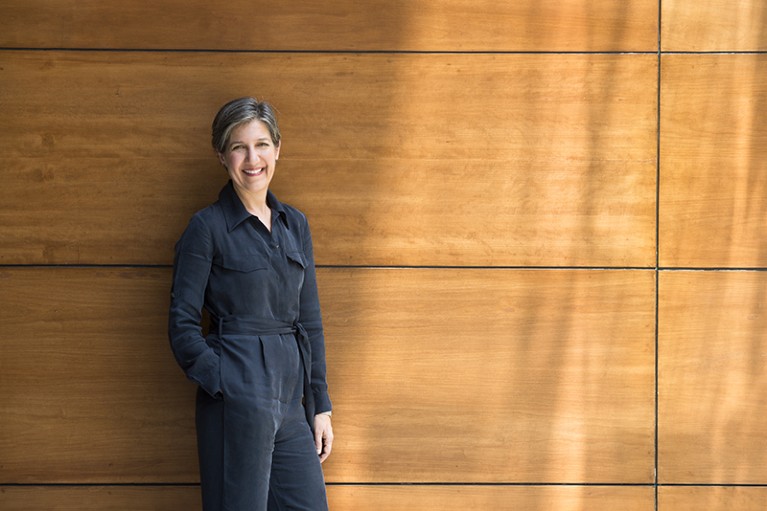
Giota Panopoulou is a health economist at Hospital Médica Sur in Mexico City.Credit: Roberto Torís/Medica Sur Clinical Foundation
Health economist Giota Panopoulou oversees research, education and social assistance efforts at Hospital Médica Sur, one of Mexico City’s largest private hospitals. She does so as director of the Médica Sur Clinical Foundation, which helps to fund research programmes at the hospital. Since the COVID-19 pandemic began, research output at the hospital has grown — scientists have studied the course of the disease, possible treatments and the effect of diet. The hospital launched one project to find non-genetic factors related to the development of liver diseases. Another, involving 700 infants, sought to identify how diet differences affect the rate of growth of children in Mexico, although this was cut short by the pandemic. Panopoulou talks to Nature about the inner workings of the foundation, what she’s learnt and the importance of medical research.
What value do you think research brings to a hospital?
It’s a relationship that nourishes both sides. When you have active research protocols in a hospital, you have access to the latest technology and to the latest drugs, and that allows you to offer better care to people. You also keep your medical staff at the forefront of modern science; they’re learning all the time. For example, a group of Médica Sur researchers found that giving people with non-alcoholic fatty liver disease more information about their diagnosis and non-invasive tests, compared with, say, liver biopsies, during appointments led them to seek more medical care1. As a result of this finding, we decided that transient elastography — a non-invasive technique that measures liver stiffness or scarring, which might be related to liver diseases — should form part of the hospital’s routine diagnostic processes.
A hospital setting also allows the researchers to identify who could participate in research programmes, so people have access to treatments much faster. Because it is a hospital, a lot of work goes into patient safety and quality of care. This means that the research prioritizes the person’s rights and health.
What is the difference between the Médica Sur hospital and foundation?
The hospital was founded by a group of 17 physicians who sought to create a private hospital of excellence in Mexico. At the time, 41 years ago, they worked for Mexico’s highly specialized national institutes of health, which focus on research, teaching and providing services to people who do not have the means to pay for health care. The founders decided that they wanted Médica Sur to replicate that on a smaller scale. And so, the foundation was born. But the foundation and the hospital are two legally separate entities; the foundation is a civil association (non-governmental organization) and the hospital is a private company.
Hospital Médica Sur does not directly fund the foundation. But it does provide a physical space to work, as well as operational and legal support. It also offers people with low incomes reduced prices for certain examinations and interventions — such as cataract surgery. In return, the foundation pays the hospital for the services it offers. Part of the foundation’s funds come from donations by pharmaceutical companies. We also receive individual donations from physicians and patients.
What kind of support does the Médica Sur foundation offer to researchers?
The foundation acts as an intermediary between the researchers, the hospital and pharmaceutical companies. It offers administrative support, particularly for research protocols that are sponsored by a company. We negotiate contracts, costs, legal terms and remuneration for the research team. All of these are just as important as the technical side. Even if you have already recruited participants, the protocol cannot move forward unless you finalize the administrative steps.
We also manage Médica Sur’s ethics committee: about 20 people, including physicians and medical staff — some from Hospital Médica Sur and some from other organizations — and professionals such as lawyers to represent the wider community.
How has the COVID-19 pandemic affected research at Médica Sur?
I’d say we’ve had three phases. In March 2020, when the pandemic began here in Mexico, there was a massive pause in health research — the hospital instead just focused on treating people. Everyone thought that the crisis was not going to last long.
But after that first period, when we realised that it was going to be here for a long time, there was a tremendous boom in the number of research protocols related to COVID-19. The number of protocols that our ethics committee reviewed doubled to 160 a year — a lot of them were COVID-related.
We were also involved in vaccine trials. Trials for Patria, a Mexican-made vaccine sponsored by the government and by pharmaceutical company Avimex in Mexico City used the hospital as a research centre for 91 volunteers. We were honoured that Médica Sur, among other places, was chosen to host a protocol such as this one, which was supported and financed with public resources.
Now, in 2022, we are slowly returning to normal. We have fewer research protocols related to COVID-19 and more associated with pathology, gastroenterology and oncology.
But COVID-19 has shown us that without research, and despite all the extraordinary advances we’ve made in health care, a disease that is difficult to diagnose and cure can be checkmate for hospitals, countries and the world.
This interview has been edited for length and clarity.
This article is part of Nature Spotlight: Research hospitals, an editorially independent supplement. Advertisers have no influence over the content.

